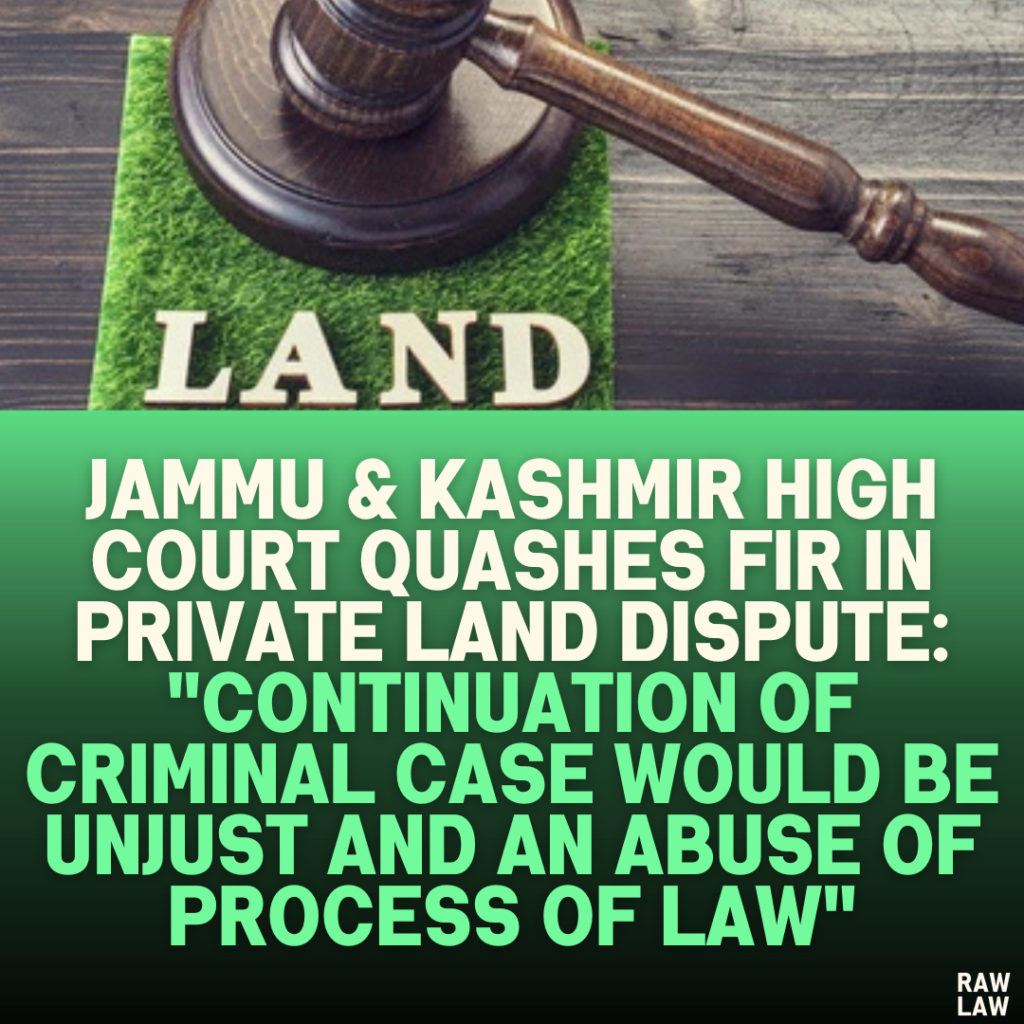Court’s Decision
The Jammu & Kashmir High Court quashed FIR No. 105 of 2023 registered under Sections 447, 427, 147, 504, and 506 IPC in view of an amicable settlement between the parties. The court held that continuing the criminal case would constitute an abuse of the process of law, given the civil nature of the dispute and the compromise reached.
Facts
- The dispute arose over land located in Jammu, which led to civil and criminal proceedings.
- The complainant filed a civil suit and an FIR, alleging trespass and damage to property by the accused.
- Subsequently, the parties resolved their differences through a compromise deed dated October 21, 2023.
- The complainant agreed to withdraw the civil suit and the FIR after the settlement.
Issues
- Whether the High Court can quash an FIR under Section 482 CrPC when some of the offenses are non-compoundable.
- Whether the nature of the offenses and the compromise between the parties warrant quashing the proceedings.
Petitioner’s Arguments
- The petitioner argued that the dispute was essentially civil in nature and had been amicably settled.
- Highlighting the Supreme Court’s judgment in Gian Singh v. State of Punjab (2012), the petitioner contended that the High Court has inherent powers to quash criminal proceedings in cases involving civil disputes where a compromise has been reached.
Respondent’s Arguments
- The state opposed the quashing but acknowledged that the dispute was predominantly civil and had been resolved through a compromise.
- The complainant supported the petitioner’s plea, stating that the issues had been settled amicably.
Analysis of the Law
The court emphasized the Supreme Court’s ruling in Gian Singh v. State of Punjab, which permits quashing of criminal proceedings in cases of private disputes with a predominant civil flavor, provided:
- The offenses are not heinous or grave.
- The possibility of conviction is remote due to the compromise.
- Continuation of the case would cause oppression or injustice.
Precedent Analysis
The court relied on Gian Singh v. State of Punjab, which distinguished between the inherent powers of the High Court under Section 482 CrPC and the statutory provisions for compounding offenses under Section 320 CrPC. The judgment emphasized that criminal cases rooted in private disputes could be quashed to secure justice and prevent the misuse of legal processes.
Court’s Reasoning
The court noted:
- The dispute was rooted in a private land matter and lacked any significant public interest.
- The compromise deed resolved all issues, rendering the continuation of the criminal case unnecessary and unjust.
- Upholding the principles laid down in Gian Singh, the court held that pursuing the FIR would amount to abuse of the process of law.
Conclusion
The court quashed FIR No. 105 of 2023, citing the amicable settlement and the lack of public interest in continuing the proceedings. It concluded that doing so was necessary to secure justice and prevent unnecessary oppression.
Implications
The judgment reinforces the principle that criminal proceedings in civil disputes can be quashed if a compromise is reached, provided the offenses are not of a heinous nature. It underscores the High Court’s discretionary powers to prevent the misuse of legal processes and promote settlements in private disputes.




Pingback: Bombay High Court Dismisses Developer's Plea to Halt MHADA Redevelopment of GTB Nagar: Rules Cooperative Society Formation Invalidates Individual Agreements, Cites Public Interest and Lack of Evidence - Raw Law